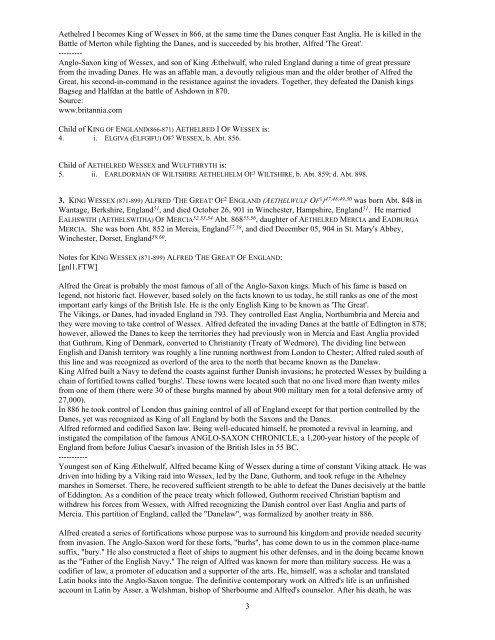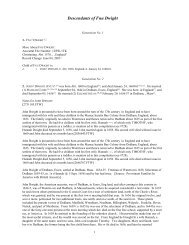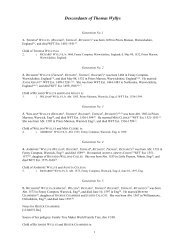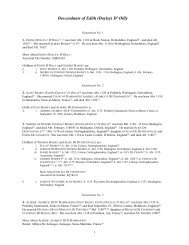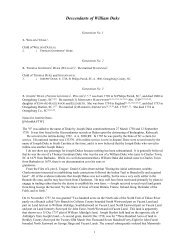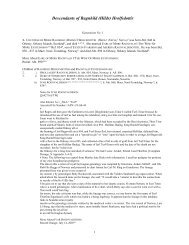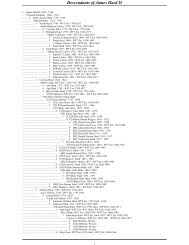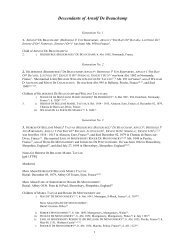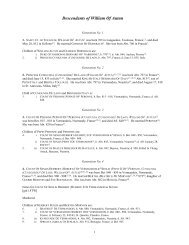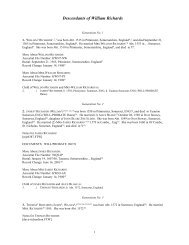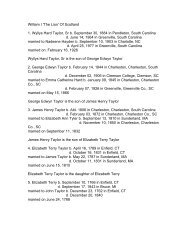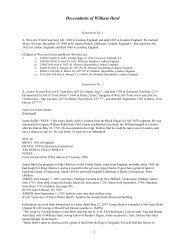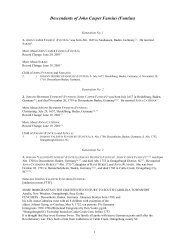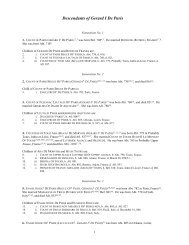Aethelwulf Of England.pdf - GBLCreations
Aethelwulf Of England.pdf - GBLCreations
Aethelwulf Of England.pdf - GBLCreations
Create successful ePaper yourself
Turn your PDF publications into a flip-book with our unique Google optimized e-Paper software.
Aethelred I becomes King of Wessex in 866, at the same time the Danes conquer East Anglia. He is killed in the<br />
Battle of Merton while fighting the Danes, and is succeeded by his brother, Alfred 'The Great'.<br />
---------<br />
Anglo-Saxon king of Wessex, and son of King Æthelwulf, who ruled <strong>England</strong> during a time of great pressure<br />
from the invading Danes. He was an affable man, a devoutly religious man and the older brother of Alfred the<br />
Great, his second-in-command in the resistance against the invaders. Together, they defeated the Danish kings<br />
Bagseg and Halfdan at the battle of Ashdown in 870.<br />
Source:<br />
www.britannia.com<br />
Child of KING OF ENGLAND(866-871) AETHELRED I OF WESSEX is:<br />
4. i. ELGIVA (ELFGIFU) OF 3 WESSEX, b. Abt. 856.<br />
Child of AETHELRED WESSEX and WULFTHRYTH is:<br />
5. ii. EARLDORMAN OF WILTSHIRE AETHELHELM OF 3 WILTSHIRE, b. Abt. 859; d. Abt. 898.<br />
3. KING WESSEX (871-899) ALFRED 'THE GREAT' OF 2 ENGLAND (AETHELWULF OF 1 ) 47,48,49,50 was born Abt. 848 in<br />
Wantage, Berkshire, <strong>England</strong> 51 , and died October 26, 901 in Winchester, Hampshire, <strong>England</strong> 51 . He married<br />
EALHSWITH (AETHELSWITHA) OF MERCIA 52,53,54 Abt. 868 55,56 , daughter of AETHELRED MERCIA and EADBURGA<br />
MERCIA. She was born Abt. 852 in Mercia, <strong>England</strong> 57,58 , and died December 05, 904 in St. Mary's Abbey,<br />
Winchester, Dorset, <strong>England</strong> 59,60 .<br />
Notes for KING WESSEX (871-899) ALFRED 'THE GREAT' OF ENGLAND:<br />
[gnl1.FTW]<br />
Alfred the Great is probably the most famous of all of the Anglo-Saxon kings. Much of his fame is based on<br />
legend, not historic fact. However, based solely on the facts known to us today, he still ranks as one of the most<br />
important early kings of the British Isle. He is the only English King to be known as 'The Great'.<br />
The Vikings, or Danes, had invaded <strong>England</strong> in 793. They controlled East Anglia, Northumbria and Mercia and<br />
they were moving to take control of Wessex. Alfred defeated the invading Danes at the battle of Edlington in 878;<br />
however, allowed the Danes to keep the territories they had previously won in Mercia and East Anglia provided<br />
that Guthrum, King of Denmark, converted to Christianity (Treaty of Wedmore). The dividing line between<br />
English and Danish territory was roughly a line running northwest from London to Chester; Alfred ruled south of<br />
this line and was recognized as overlord of the area to the north that became known as the Danelaw.<br />
King Alfred built a Navy to defend the coasts against further Danish invasions; he protected Wessex by building a<br />
chain of fortified towns called 'burghs'. These towns were located such that no one lived more than twenty miles<br />
from one of them (there were 30 of these burghs manned by about 900 military men for a total defensive army of<br />
27,000).<br />
In 886 he took control of London thus gaining control of all of <strong>England</strong> except for that portion controlled by the<br />
Danes, yet was recognized as King of all <strong>England</strong> by both the Saxons and the Danes.<br />
Alfred reformed and codified Saxon law. Being well-educated himself, he promoted a revival in learning, and<br />
instigated the compilation of the famous ANGLO-SAXON CHRONICLE, a 1,200-year history of the people of<br />
<strong>England</strong> from before Julius Caesar's invasion of the British Isles in 55 BC.<br />
-----------<br />
Youngest son of King Æthelwulf, Alfred became King of Wessex during a time of constant Viking attack. He was<br />
driven into hiding by a Viking raid into Wessex, led by the Dane, Guthorm, and took refuge in the Athelney<br />
marshes in Somerset. There, he recovered sufficient strength to be able to defeat the Danes decisively at the battle<br />
of Eddington. As a condition of the peace treaty which followed, Guthorm received Christian baptism and<br />
withdrew his forces from Wessex, with Alfred recognizing the Danish control over East Anglia and parts of<br />
Mercia. This partition of <strong>England</strong>, called the "Danelaw", was formalized by another treaty in 886.<br />
Alfred created a series of fortifications whose purpose was to surround his kingdom and provide needed security<br />
from invasion. The Anglo-Saxon word for these forts, "burhs", has come down to us in the common place-name<br />
suffix, "bury." He also constructed a fleet of ships to augment his other defenses, and in the doing became known<br />
as the "Father of the English Navy." The reign of Alfred was known for more than military success. He was a<br />
codifier of law, a promoter of education and a supporter of the arts. He, himself, was a scholar and translated<br />
Latin books into the Anglo-Saxon tongue. The definitive contemporary work on Alfred's life is an unfinished<br />
account in Latin by Asser, a Welshman, bishop of Sherbourne and Alfred's counselor. After his death, he was<br />
3


